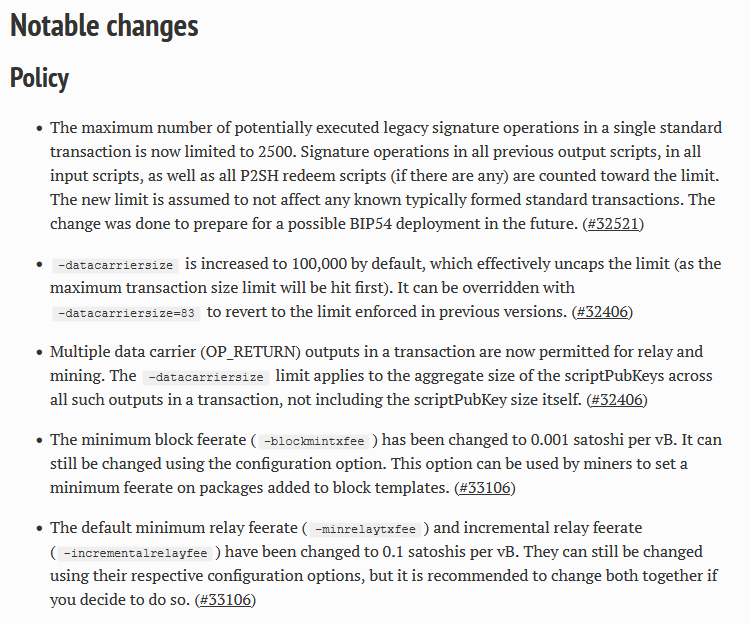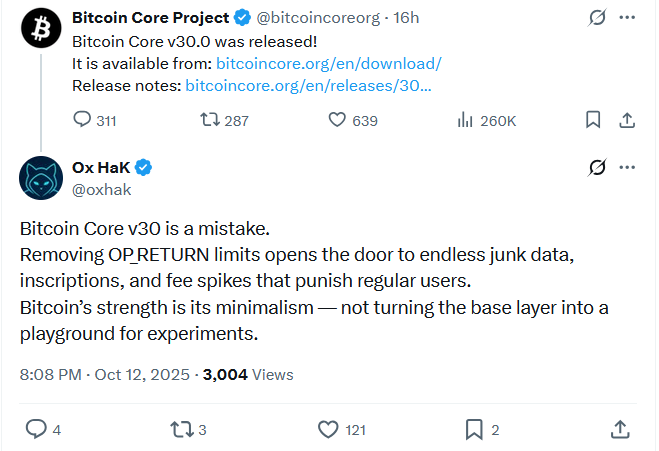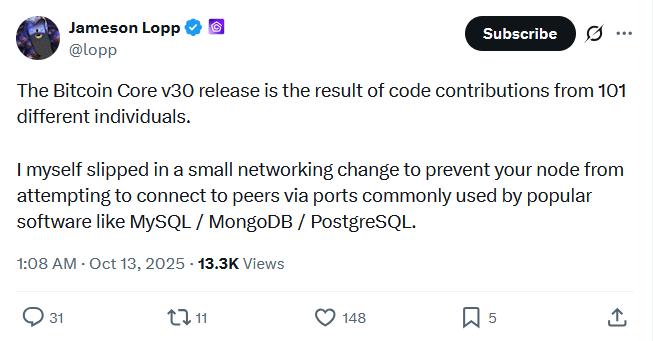Bitcoin Core V30 Officially Launches To Mixed Community Reaction
Bitcoin Core developers saw a mixed reaction from the Bitcoin community as they announced the release of their v30 update, bringing forward a host of node-related changes to architecture, performance, and security.
The key changes brought forward in Bitcoin Core 30.0 are the introduction of optional encrypted connections between nodes for better privacy and the increase of the OP_RETURN data limit within Bitcoin Core software from 80 to 100,000 bytes, enabling a significantly larger amount of non-financial data to be embedded in Bitcoin transactions.
“With the release of this new major version, versions 27.x and older are at ‘End of Life’ and will no longer receive updates,” the Sunday announcement reads.

While the update also included bug fixes, performance improvements and changes to fee rates, the biggest issue to stir debate in the community is the increase of the OP_Return limit.
Such a huge shift in the data limit enables the development of more sophisticated and data-hungry decentralized applications on the network, but has angered Bitcoin purists who argue that the network should be used only for financial transactions.

New blocksize wars
While this wasn’t a protocol change, the current debate sparks memories of the block size wars of 2017, which ultimately led to a Bitcoin hard fork in Bitcoin Cash.
Some see the update as a good thing, such as Ark Labs Ecosystem Lead Alex Bergeron, who said via X on Friday that he intends “to use all of the additional OP_Return space and WILL use it to make Bitcoin more like Ethereum, except better.”

While Satoshi Labs co-founder Pavol Rusnak also stated yesterday that he was opting for Bitcoin Core v30 due to having “great development team, peer-reviewed code,” and “sane engineering decisions.”

Others were not so optimistic, arguing that it goes against Bitcoin’s fundamental principles of being a peer-to-peer electronic cash system and could lead to blockchain bloat, increased node operation costs and legal issues.
One workaround that a significant number of node operators have already been utilising is the alternative node software known as “knots,” as it enables them to enforce strict data size limits, such as 80 bytes, on transactions.
“As a (hopefully) temporary measure, run Knots. I strongly recommend not upgrading to Core v30,” noted pioneer cryptographer Nick Szabo via X last week.
Related: Bitcoin eyes $114K liquidity grab as traders bet on BTC price rebound
Earlier this month, Szabo raised concerns about the legal implications of the data limit increase, as node operators run the risk of hosting “illegal data.”
“Without adding safeguards to allow archival node operators to non-disruptively delete illegal content for which they will often be held criminally liable,” he noted via X on Oct. 2.
The founder of knots, Luke Dashjr, has not commented on the update since it went live; however, he has been critical of the latest Bitcoin Core update.

Data shows that a significant number of node operators are utilising Knots software, with data from BitRef indicating that there are currently 5,114 Knots nodes, representing 21.48% of all Bitcoin nodes.
Magazine: Bitcoin’s ‘macro whiplash,’ Shuffle suffers data breach: Hodler’s Digest, Oct. 5 – 11


